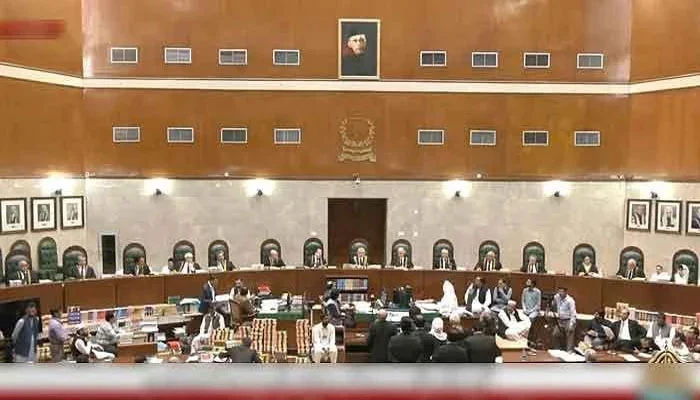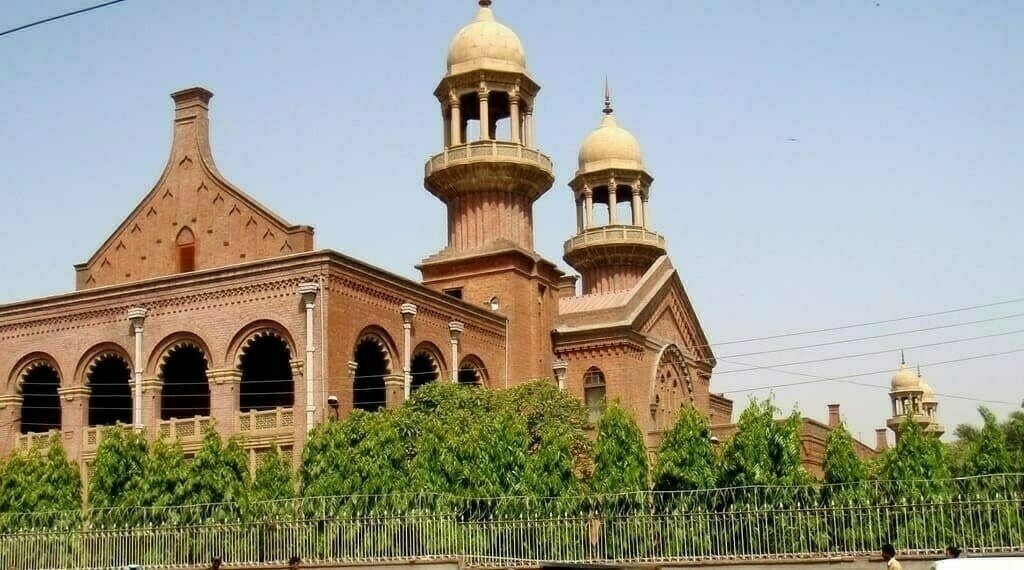In a recent hearing at the Supreme Court of Pakistan, tensions arose between Chief Justice Qazi Faez Isa and Justice Manzoor Akhtar during questioning of a lawyer regarding the Practice and Procedure Act.
The Supreme Court of Pakistan, under the leadership of Chief Justice Qazi Faez Isa, heard requests related to the Practice and Procedure Act. Justices Sardar Tariq Masood, Aijazul Ahsan, Syed Mansoor Ali Shah, Manzoor Akhtar, Yahya Afridi, Ameen Uddin Khan, Syed Mazhar Ali Akbar Naqvi, Jamal Khan Mandokhail, Muhammad Ali Mazhar, Aisha A. Malik, Atir Mahmood, Syed Hasan Azhar Rizvi, Shahid Wahid, and Musarrat Hilali were present during the proceedings.
During the hearing, Chief Justice Qazi Faez Isa instructed MQM’s lawyer, Faisal Siddiqui, to focus on presenting his arguments instead of attempting to answer every question from the bench. He emphasized that if Siddiqui preempts his arguments by answering every query, the hearing might not conclude. However, Justice Manzoor Akhtar countered, asserting that as part of the bench, he had the right to ask questions and lamented that his queries were being interrupted.
Faisal Siddiqui, representing the Muttahida Qaumi Movement (MQM), argued that the case did not concern him directly but was brought to the court’s attention due to a notice issued. He questioned whether the Supreme Court could alter the Practice and Procedure Act, a legislation derived from a simple majority. He also mentioned two decisions: the Bakar Case and the Supreme Court Review Act, suggesting their relevance to the current case.
Justice Aisha A. Malik questioned the use of the term ‘laa’ (excluding) in Article 191, granting Parliament legislative authority. She noted that the term indicated Parliament’s power to exclude any particular area of law-making. She further challenged the interpretation of ‘laa,’ stating that it was a distinct section in Supreme Court Rules.
Justice Aijazul Ahsan posed a crucial question, challenging the lawyer’s arguments. Chief Justice Qazi Faez Isa intervened, advising Siddiqui not to answer every question right away. He emphasized the need for Siddiqui to complete his arguments before addressing the bench’s queries comprehensively.
Justice Manzoor Akhtar retorted that he had the right to ask questions as a part of the bench, and stifling his queries would render his presence futile.
In response to the ongoing debate, Faisal Siddiqui reiterated his stance, emphasizing that he would address each query, considering every legal aspect. The discussion centered around the interpretation of Article 191, raising significant legal questions about the Parliament’s legislative authority and the judiciary’s role in reviewing legislation.
In the recent legal discourse within Pakistan, a heated debate has emerged concerning the Supreme Court’s jurisdiction, specifically revolving around the interpretation and implementation of Article 55 of the Constitution. This controversy began with a case involving Faisal Siddiqi, a prominent lawyer, and various judges of the Supreme Court, including Justice Mansoor Ali Shah and Chief Justice Qazi Faez Isa.
The crux of the matter lay in the interpretation of Article 55, which pertains to the expansion of the Supreme Court’s jurisdiction. Faisal Siddiqi argued that Entry 55 of the Constitution, when read in conjunction with Article 175-A, granted Parliament the authority to expand the Supreme Court’s jurisdiction, thereby allowing the Court to hear appeals directly from the High Courts.
However, the judges, notably Chief Justice Qazi Faez Isa and Justice Mansoor Ali Shah, expressed skepticism regarding this interpretation. They questioned whether such an expansion of jurisdiction could be achieved through legislative amendments alone. The debate delved into the nuances of constitutional interpretation, exploring whether Parliament had the power to alter the fundamental jurisdiction of the Supreme Court.
The crux of the debate revolved around the wording of Article 55, with Justice Mansoor Ali Shah highlighting the need for clarity on where the Constitution confers the power to enhance the constitutional jurisdiction, particularly in matters of appeals. The discussion also touched upon the role of the judiciary in upholding the separation of powers, emphasizing the delicate balance between the branches of government.
Faisal Siddiqi contended that the Supreme Court, through Entry 55, could indeed expand its jurisdiction. He cited legal precedents and argued that the language used in Articles 184(3), 199, and 185 did not impose any restrictions on the Court’s appellate jurisdiction. Furthermore, he emphasized that Article 175-A provided a legal basis for the Parliament to enact laws expanding the Supreme Court’s jurisdiction.
In essence, the controversy surrounding Article 55 underscores the complexities of constitutional interpretation in Pakistan. As the legal community grapples with these issues, the case highlights the importance of a nuanced understanding of constitutional provisions and their implications on the balance of power within the state. The outcome of this debate will likely have far-reaching consequences on the legal landscape of Pakistan, shaping the future jurisdictional boundaries of the Supreme Court.



